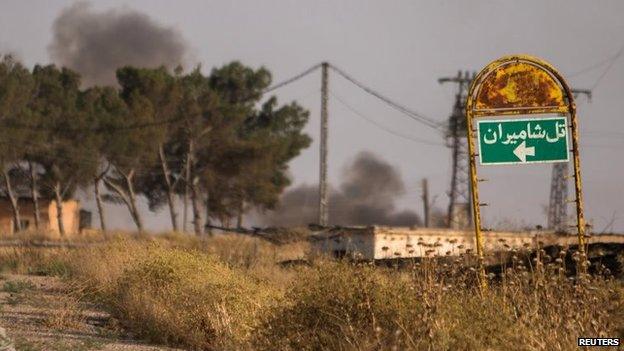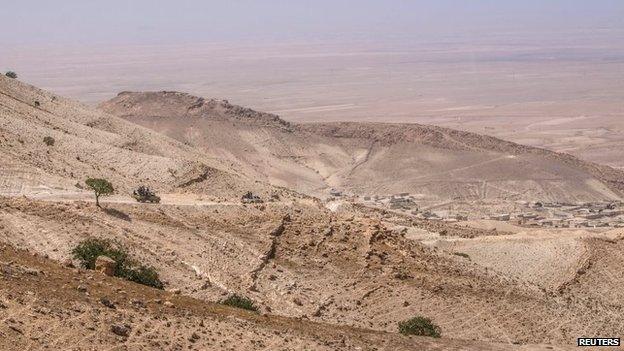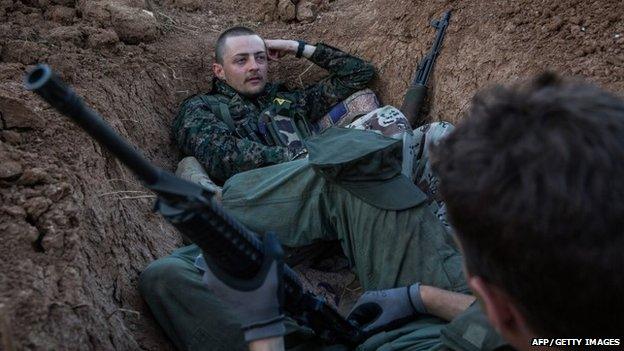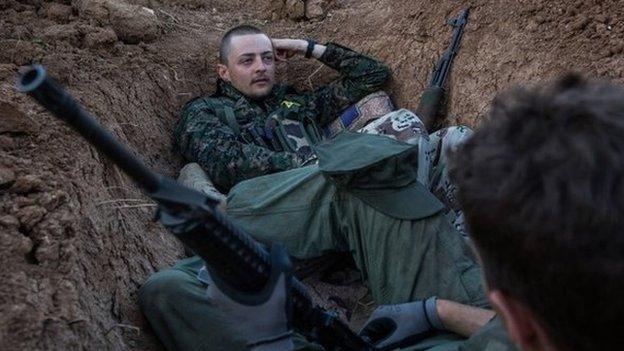'Bone-tired' UK volunteers home after fighting IS
- Published
"If you think that it is in the public’s interest to prosecute me, then do your worst. I’ll have to take that when it comes," Harry told Quentin Sommerville
Dozens of foreigners have been fighting alongside Kurdish forces battling the jihadist group Islamic State (IS) in northern Syria. Some are now returning home despite the risk of being prosecuted, including two Britons who spoke to the BBC's Quentin Sommerville.
It was how he ate his boiled egg that gave away the fact that Harry had been gone for a while.
He picked it up out of the egg cup, and was about to tap it on the table, to break the shell and peel it with his hands.
He stopped. "I'm eating my egg like a Kurd," he said.
Then he put it back in the cup, lopped off the top, and set about the runny insides with a teaspoon. Just like a good Englishman.
Harry is from Cambridge, but had been, for the last five months, fighting the Islamic State in Syria.
I'd first met him there, alongside the Kurdish People's Protection Units (YPG) militia fighters, right on the front lines.
Now we were having breakfast together in a smart hotel in northern Iraq. And Harry was getting ready to go home.
Experience of battle
When we met in the spring, I didn't rate his chances as a fighter.

Islamic State militants captured dozens of predominantly Kurdish towns and villages last year
He was a former currency trader, with no military experience. Tall and slim, his curly-haired head would stick out a mile in north-eastern Syria.
And what IS would have done to get their hands on 28-year-old, terribly well-mannered Harry.
Having beheaded most of their Western hostages, they needed more.
Harry's changed over the last few months, and the video footage on his mobile phone helped explain why.
There's Harry firing a Dragunov sniper rifle at the enemy.
Next, he's riding on the back of a pick-up truck as tanks charge forward on either side.
Then there are coalition air strikes landing close by on IS positions. Off camera, Harry and his fellow fighters, whoop and scream with delight.
Kurdish advances
But it's not all boys-own-adventure stuff.
"Because of our efforts... many families have now returned to their homes and left refugee camps... that makes this whole thing worth it," an American fighter told Quentin Sommerville
There are the rotting corpses of IS soldiers killed in battle, a 15-year-old with his brains literally blown out, and there are pictures of the hard life: stale bread, terrible rations, and plagues of flies.
The night before our interview was Harry's first time in a proper bed in as long as he could remember.
He'd grown thinner over the past few months. Those bad rations and hours of marching and fighting did that.
He still has a passion - bordering on naivety - for freedom, democracy, and so on - though perhaps a little less fervent these days.
After all, he is, he said, tired now, bone-tired. So it was, he told me, time to go home.
The YPG had regained hundreds of kilometres from Islamic State. Admittedly much of this was in sparsely-populated areas.
There was a lull in the fighting and Harry and the other foreigners I met - Americans, a New Zealander, another Brit - all admitted they were bored.
Media attention
Was he treating this like a gap year, I asked?
"No," replied Harry. He'd seen friends die and had been as little as 20m from IS at some points.

Harry found an Islamic State flag after the YPG captured the strategic Abdul Aziz mountain
And he'd taken part in wave after wave of attacks that in the end, failed to dislodge IS from a village.
An extra pair of hands was useful on the battlefield, whether foreign or local, he said.
But there were plenty of local Kurds or Arabs willing to take up arms against IS. Foreign fighters brought something else - international attention to the Kurdish cause and the battle against IS.
For Harry and his fellow foreigners, the increased number of air strikes in the past few months has partly been as a result of that intensified focus on the struggle.
"When Kurds join the fight, it isn't news. When we come, people are interested," said Harry's friend Jac Holmes, 22, from Bournemouth.
Baby-faced, I'd last met the former IT worker in hospital in Syria. He'd been shot in the arm.
Now he had a pink scar… two small bumps. Not quite the battle scar he'd hoped for.
'Not a terrorist'
Jac too was going home.
Britons are warned against travelling to Iraq and Syria, and certainly warned against joining the conflict, whichever side they choose.

Jac Holmes was photographed in April guarding a YPG position in northern Syria
However, Prime Minister David Cameron has made plain that he sees a difference between those who fight for IS and those who take up arms against it.
Jac had been stopped on his way to join the war.
He was taking an Iraqi Airways flight - "I was the only white face on it," he giggled - and police stopped him before he boarded.
He told them his intention to travel to Syria and join a foreign war. They let him go regardless.
Harry had a nervous flight back. But at Heathrow, he sailed through the border checks, and wasn't stopped.
Making it back home safely, he said, "Maybe they don't think I'm a terrorist... I went to help people, it's not controversial."
How to listen to From Our Own Correspondent, external:
BBC Radio 4: Thursdays at 11:00 BST and Saturdays at 11:30 BST
Listen online or download the podcast.
BBC World Service: At weekends - see World Service programme schedule or listen online.
Subscribe to the BBC News Magazine's email newsletter, external to get articles sent to your inbox.
- Published14 May 2015
